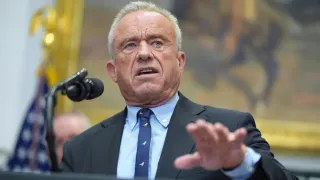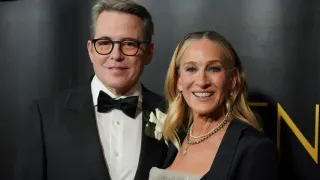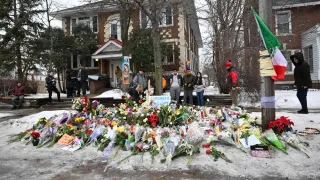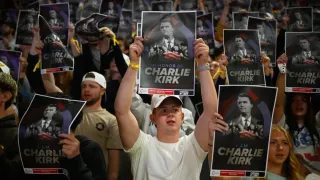February 15, 2017
'La La Land': The Curiously Divisive Oscar Front-Runner
Jack Coyle READ TIME: 4 MIN.
NEW YORK -- These are divisive times. Agreement is hard to come by. Passions on both sides are inflamed. And "Saturday Night Live" is providing some of the most trenchant satire on the matter.
We are speaking, of course, about "La La Land." No film - not Mel Gibson's bloody Christian war tale "Hacksaw Ridge," not Paul Verhoeven's rape drama "Elle" - has sparked the kind of opinion clash that Damien Chazelle's toe-tapping musical about showbiz dreamers has.
It's not just another day of sun, as the movie's opening number goes. It's another day of think pieces.
"La La Land," romantic and sincere, might seem an unlikely lightning rod. But that's the life of the front-runner, which "La La Land" most definitely is. It's made more than $300 million at the box office, globally (remarkable for a $30 million movie). It matched the record of 14 Academy Awards nominations. It set a new Golden Globes mark with seven wins. And most recently, it triumphed at the British Academy of Film and Television Awards.
One of the curious aspects of today's Oscar season is that the movies that somehow managed to get made and released in franchise-crazy Hollywood and that then somehow rise to the Oscars, aren't celebrated so much as the Academy Awards nears. Reaching this zenith often means getting torn apart for imperfections, blind spots and - horror of horrors - sub-Astaire dancing.
The backlash was inevitable for "La La Land." It's just a matter now of whether - as most expect - the tide will turn back in time for the February 26 Oscars. So to help you decide what side you're on in this most crucial of battles, here's a rundown of the case against "La La Land."
TOO DERIVATIVE
Some critics have said that "La La Land," for all its charms, is a pale impression of the earlier musicals it was inspired by. There are the classic Hollywood backlot musicals like Fred Astaire and Cyd Charisse in Vincente Minnelli's "The Band Wagon" (1953) and, of course, "Singin' in the Rain" with Gene Kelly and Debbie Reynolds. Or there's the on-the-street French musicals of Jacques Demy, like "The Umbrellas of Cherbourg" and "The Young Girls of Rochefort," which inspired the opening freeway scene of "La La Land." These were the real-deal originals, they say.
Counter: This is one that probably even Chazelle wouldn't much quibble with. He's spoken often and with reverence for these and other musicals. "La La Land" is undoubtedly deeply animated by nostalgia, but its characters - and the movie, itself - hinges on finding a contemporary experience with some connection to the classical.
THE DANCING
For others, the song-and-dance skills of Gosling and, to a lesser extent, Stone, aren't up to the standards of Kelly, Reynolds or Astaire. The pair trained with choreographer Mandy Moore and Gosling learned to play his piano parts without any previous experience on the keys. They may be quick studies, but they aren't the equals of the musical greats.
Counter: Well, who is? That's a high bar to meet. And part of the appeal of "La La Land" is that its characters, even as they soar, are more down to earth. Besides, the considerable gifts of Stone and Gosling are more than just footwork. They're a heck of a lot funnier than Astaire, for starters. But it's probably a good thing that the movie's two nominated songs will be performed by co-star John Legend, not Gosling or Stone, at the Oscars.
TOO WHITE
In the "SNL" sketch, Aziz Ansari is grilled by police detectives for his crime of not being head-over-heels about "La La Land." ''I liked the movie. I just didn't love it," he protests. "It's a whole movie about jazz and there's no black people in it." Others have gone further in analyzing the film's racial undercurrents. MTV's Ira Madison called the movie "a white-savior film in tap shoes ," criticizing it for making Gosling's character, Seb, the defender of true jazz, and Legend's bandleader character the sell-out. For an African American-created art form, this is backward.
Counter: This one is hard to shake. It could be argued that "La La Land" is almost totally focused on its two leads. (This is why many believe it was passed over for the Screen Actors Guild top honor, best ensemble.) There are no significant parts beyond Gosling and Stone, and that limitedness may be to the film's detriment, dramatically and culturally. It's a glaring deficiency this year, too, because after two straight years of "OscarsSoWhite" backlash, inclusion is the theme of this year's Academy Awards. Six African-American actors are nominated and several best-picture contenders - "Moonlight," ''Fences" and "Hidden Figures" - make for a stark contrast with "La La Land."
ITS JAZZ IS OFF
Others have taken issue with not just the racial undertones of the movie's jazz, but of its portrait of the music. Jazz has been a specialty for Chazelle, a passionate aficionado who grew up playing drums and whose previous film, "Whiplash," was about a jazz drummer. But some critics say the film's view of jazz is clich�d, that its terms - of jazz "purity," of relevance - are out of sync with the more dynamic modern landscape of jazz.
Counter: Some of this may be confusing the perspective of Seb - whose self-seriousness is often meant to be a joke - for that of the movie. But it's also possible that we all have bigger things to worry about than the authenticity of the jazz in "La La Land."






